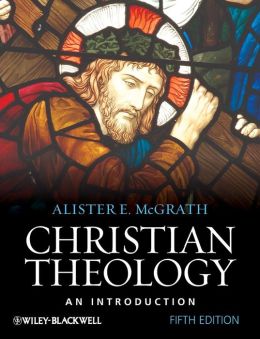This book was comprehensive but not exhaustive. Christian Theology is indisputably a "textbook" proper, i.e., "a book used as a standard work for the study of a particular subject." What the book lacks in imagination, i.e., style, tone, voice, allusion, etc., McGrath compensates for with factoid and reference factors, e.g., a useful (shock!!!) index, glossary, and primary source citations. Such being the case, the book will sit on my bookcase next to other useful theological reference works, e.g., Lewis and DeMarest's Integrative Theology (3 vol.), Beeke and Ferguson's Reformed Confessions Harmonized, Hodge's Outlines of Theology, Beeke and Jones's A Puritan Theology, etc.
The book is truly comprehensive: "The present volume therefore assumes that its reader knows nothing about Christian theology. . . . This book is ideally placed to help its reader gain an appreciation of the rich resources of the Christian tradition. Although this is not a work of Catholic, Orthodox, or Protestant theology, great care has been taken to ensure that Catholic, Orthodox, and Protestant perspectives and insights are represented and explored" (xxii-xxiii). McGrath gladly admits "My aim in this work has not be to persuade but to explain" (xxiii). That is good in one sense, but bad in the sense that McGrath does not provide direction on what ideas the reader's mind-trap ought to go "slam!" on.
In addition to the already mentioned "factoid and reference factors" the book's structure was very helpful. McGrath wants to expose readers the "themes of Christian theology" but he also wants to "enable them to understand them" (xxvii). Thus, the book is split into three parts: Part I covers the "landmarks" of Christian theology, i.e., the historical development of Christian theology neatly broken into four parts (Patristic c. 100-700; Middle Ages/Renaissance, c. 700-1500; Reformation, c. 1500-1750; Modern, c. 1750-the Present); Part 2 covers "Sources and Methods," i.e., Prolegomena; the quadrilateral of Scripture, Tradition, Reason, Religious Experience; the ideas/categories of divine revelation and natural theology; and a high overview of different approaches to the relationship between Philosophy and Theology); Part 3 covers "Christian Theology" in its traditional creedal outline, i.e., "We shall use the structure of the traditional Christian creeds as a framework for our exploration of the leading topics of Christian theology" (197). This structure is where the book is at its strongest--the author's aim for his readers to know and understand the themes of Christian theology.
My undergraduate degree is in Religion and Philosophy, so I enjoyed Part 2 - Chapter 8, "Philosophy and Theology: Dialogue and Debate," and Part 3 - Chapter 17, "Christianity and the World Religions." Nothing new therein, but thoroughly enjoyable--like shaking up and searching through the catch-all, "junk drawer" in a home, revisiting those chapters stirred up a bunch lost, "junk drawer -- "wellwouldyoulookatthat" and "ha, cool!" -- philosophic ideas and memories. ;)
It was a bit of a chore to trudge through 450+ pages of dry academic prose that attempted to be objective, but it was well worth it. To have another good reference work that has been thumbed through and heavily underlined with marginal notes is always a good thing to have; later on in life when the brain-gears are getting rusty and the recall and recollection skills are taxed with the weight of decades I will be even more thankful.
My 8 word aphoristic review: A non-scintillating but thorough rehearsal of Christian theology. As McGrath may say, Cheers!

No comments:
Post a Comment